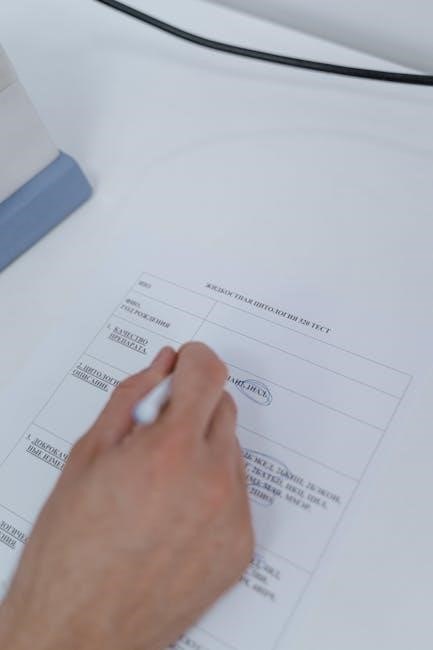The Idaho Commercial Driver’s License Manual is a comprehensive guide for safe driving practices and federal regulations. It helps drivers prepare for CDL exams, covering state and federal laws, updated annually to ensure compliance and safety on the road. This manual is an essential resource for anyone seeking a commercial driver’s license in Idaho, providing detailed information to pass the required tests and drive responsibly.
Eligibility Requirements for Obtaining a CDL in Idaho
To obtain a CDL in Idaho, applicants must meet specific criteria, including age requirements, residency, medical certification, and legal status. They must also submit required documentation to the Idaho DMV.
2.1. Age Requirements
In Idaho, applicants for a CDL must be at least 18 years old for intrastate driving and 21 years old for interstate commercial driving. These age requirements ensure that drivers meet federal and state regulations for operating commercial vehicles safely and responsibly. Applicants must verify their age through valid documentation when applying for a CDL.
2.2. Residency and Legal Status
Applicants for an Idaho CDL must be state residents and provide proof of legal U.S. residency. Valid documentation, such as a birth certificate or Social Security card, is required to establish eligibility. Non-citizens must provide immigration documents showing lawful presence in the United States. Residency verification ensures compliance with federal and state regulations for issuing a commercial driver’s license.
2.3. Medical Certification
CDL applicants in Idaho must meet strict medical standards to ensure public safety. A medical certificate from an FMCSA-certified examiner is required. The exam assesses vision, hearing, blood pressure, and physical ability to operate a commercial vehicle. Drivers must maintain valid certification, with periodic renewals to keep their CDL active and comply with federal regulations for health and safety standards.
Classes of Commercial Driver’s Licenses
Idaho offers Class A, B, and C CDLs, each authorizing operation of specific commercial vehicles. Class A covers combination vehicles, Class B for heavy straight trucks, and Class C for small passenger or hazardous materials vehicles, ensuring drivers are licensed for their specific job requirements and vehicle types.
3.1. Class A CDL
A Class A CDL in Idaho is required to operate combination vehicles with a trailer in excess of 10,001 pounds. This license allows drivers to operate tractor-trailers, flatbeds, and other large commercial vehicles. It is the most comprehensive CDL class, enabling drivers to handle long-haul and interstate routes. Applicants must be at least 21 years old and pass rigorous skills and knowledge tests.
3.2. Class B CDL
A Class B CDL in Idaho authorizes the operation of heavy straight trucks and buses, including those with trailers, but not in combination with a trailer exceeding 10,001 pounds. This license is ideal for drivers operating delivery trucks, dump trucks, or public transportation vehicles. Applicants must meet residency and medical requirements and demonstrate proficiency in operating these specific vehicle types.
3.3. Class C CDL
A Class C CDL in Idaho is required for operating small passenger vehicles or hazardous materials carriers that do not meet Class A or B weight thresholds. This license is ideal for drivers transporting up to 16 passengers or handling Hazmat materials. It is less complex than Class A or B, making it suitable for specific vocational or local transportation needs.

The CDL Application Process in Idaho
The CDL application process in Idaho involves submitting required documents, paying fees, and completing the application form. This ensures compliance with state and federal regulations for safe road practices.
4.1. Submitting Required Documents
To apply for a CDL in Idaho, you must submit proof of identity, residency, and legal status. Required documents include a valid birth certificate, Social Security card, and two proofs of Idaho residency. Additional documentation, such as a medical certification, may be needed depending on the type of CDL and endorsements. Ensure all documents are valid and meet DMV requirements for processing.
4.2. Paying Fees
The fee for a CDL in Idaho varies based on the license term and type. A 1-year CDL for applicants under 21 is $15, while a 3-year CDL costs $30. Additional fees apply for endorsements, knowledge tests, and skills tests. Payment can be made via cash, credit card, or check at the DMV office. Ensure correct payment for timely processing.
4.3. Completing the Application Form
Complete the CDL application form accurately, providing personal and employment details. Submit required documents, such as proof of residency and medical certification. Ensure all information is correct to avoid delays. The form can be submitted online or in person at an Idaho DMV office. Double-check all details before submission to ensure smooth processing of your application;
Written Knowledge Tests
The Idaho CDL written knowledge tests assess familiarity with safety regulations, traffic laws, and specific endorsements. Studying the Idaho CDL Manual ensures effective preparation for these exams.
5.1. General Knowledge Test
The general knowledge test covers fundamental commercial driving concepts, including traffic laws, safe driving practices, and vehicle control. It ensures drivers understand basic regulations and safety measures essential for operating a commercial vehicle in Idaho. This test is mandatory for all CDL applicants and must be passed before progressing to endorsement-specific exams or the skills test.
5.2. Endorsement-Specific Tests
Endorsement-specific tests assess knowledge for specialized Commercial Driver’s License (CDL) endorsements, such as hazardous materials, passenger vehicles, or tankers. These exams ensure drivers understand unique safety protocols, legal requirements, and operational procedures for their specific endorsement. Passing these tests demonstrates expertise in handling specialized cargo or vehicles, aligning with federal and state regulations to maintain public safety on Idaho roads.

CDL Skills Tests
CDL skills tests evaluate a driver’s ability to operate a commercial vehicle safely. They include a pre-trip inspection, basic vehicle control maneuvers, and on-road driving assessment to ensure competence behind the wheel.
6.1. Vehicle Inspection
The vehicle inspection test assesses the driver’s ability to identify and report defects in the commercial vehicle. It includes checking brakes, tires, lights, and other critical systems. Proper inspection ensures safety on the road and is a mandatory part of the CDL skills test in Idaho. Drivers must demonstrate thorough knowledge of pre-trip inspection procedures to pass this section.
6.2. Basic Vehicle Control
Basic vehicle control tests evaluate a driver’s ability to safely maneuver a commercial vehicle. This includes straight-line backing, offset backing, and turning within confined spaces. Proper alignment and control are critical to avoid accidents. Drivers must demonstrate precise handling and awareness of their vehicle’s dimensions and surroundings during these exercises to pass the skills test successfully in Idaho.
6.3. On-Road Driving
The on-road driving test evaluates a driver’s ability to interact with traffic and follow all traffic laws safely. During this phase, drivers demonstrate their skills in turning, lane changes, and speed control. Smooth and controlled driving techniques are essential, ensuring adherence to Idaho’s Commercial Driver’s License requirements for safe and responsible operation of a commercial vehicle.
Endorsements and Restrictions
Endorsements and restrictions define the scope of a CDL holder’s privileges, ensuring they meet specific requirements for specialized cargo or vehicle types, enhancing road safety and compliance.
7.1. Hazardous Materials Endorsement
To obtain a hazardous materials endorsement, applicants must pass a background check and a written test. This endorsement is required for transporting hazardous materials, ensuring compliance with federal and state safety regulations. Drivers must maintain a valid medical certification and adhere to specific handling and transportation guidelines to uphold public safety and legal standards.
7.2. Passenger and Tank Vehicle Endorsements
Obtaining a Passenger Endorsement requires passing a specialized test, ensuring safe transportation of passengers. A Tank Vehicle Endorsement mandates knowledge of liquid or gas cargo handling. Both endorsements demand adherence to strict safety protocols and periodic recertification to maintain compliance with federal and state regulations, ensuring public safety and operational excellence in specialized transportation roles.
7.3. Restrictions on CDL
CDL holders face specific restrictions, including medical certification requirements and vision standards. Drivers under 21 cannot operate across state lines, and certain offenses, like DUI or felony convictions, can lead to disqualification. Restrictions may also apply based on endorsements or violations, ensuring public safety and compliance with federal and state regulations governing commercial vehicle operation;
Safe Driving Practices
Safe driving practices emphasize defensive techniques, emergency handling, and maintaining medical fitness. Adhering to traffic laws, proper vehicle inspection, and cautious behavior ensure road safety for all users.
8.1. Defensive Driving Techniques
Defensive driving techniques are essential for safe commercial vehicle operation. This includes maintaining a safe following distance, being aware of surroundings, and anticipating other drivers’ actions. Drivers should always adjust speed according to road conditions and use mirrors effectively to monitor blind spots. These practices help reduce accidents and ensure a safer environment for all road users.
8.2. Handling Emergency Situations
Handling emergency situations requires quick thinking and proper training. Drivers should remain calm, secure the vehicle, and alert others if needed. Always keep an emergency kit on board. Knowing procedures for fires, breakdowns, or medical emergencies is crucial. Proper use of reflective triangles and flares can enhance safety. Stay prepared and follow established protocols to minimize risks and ensure safe outcomes.
Medical Requirements for CDL Holders
CDL holders must meet strict medical standards set by the FMCSA, passing regular exams by certified professionals to ensure they are fit to drive commercially.
9.1. Medical Certification Process
To obtain a CDL in Idaho, drivers must undergo a medical examination by an FMCSA-certified examiner. The process involves a physical evaluation to ensure the driver meets federal health standards. Upon passing, drivers receive a medical certificate that must be submitted to the Idaho DMV. This certification ensures compliance with safety regulations and must be renewed periodically to maintain CDL eligibility.
9.2. Maintaining Medical Fitness
CDL holders must maintain medical fitness to ensure public safety. Drivers are required to undergo periodic medical exams and update their certification as needed. They must self-assess their health daily and report any conditions that could affect driving ability. Employers and the DMV must be notified of any medical changes to comply with federal regulations and maintain CDL eligibility.
CDL Fees and Renewal Process
The CDL renewal process in Idaho involves submitting updated documents and fees. The fee structure varies based on the license duration, ensuring compliance with state regulations.
10.1. Fee Structure
The CDL fee structure in Idaho varies based on age and license duration. Applicants aged 20 and above pay $15 for a 1-year license, while those aged 18 to 21 pay $30 for a 3-year license. These fees are part of the renewal process and must be paid at the time of application.
10.2. Renewal Requirements
CDL renewal in Idaho requires completing a renewal application, paying applicable fees, and providing updated medical certification. Licenses can be renewed online, in person, or by mail, with options varying based on eligibility. Continuous updates to medical fitness and adherence to federal regulations are mandatory to maintain a valid CDL.

Violations and Penalties
Violations of traffic laws or safety regulations result in penalties, including fines, points on the driver’s record, and potential CDL disqualification. Severe offenses may lead to license suspension or revocation, impacting a driver’s ability to operate commercially.
11.1. Traffic Violations
Traffic violations committed by commercial drivers can lead to severe penalties, including fines and points on their driver’s record. These infractions may result in CDL suspension or disqualification, impacting their ability to work. Repeated offenses can accumulate, leading to more serious consequences.
Idaho enforces strict regulations to ensure public safety. Severe violations, such as reckless driving or DUI, can result in permanent CDL revocation. Employers also monitor these records, making it crucial for drivers to maintain a clean driving history to retain their commercial privileges.
11.2. Disqualification of CDL
Disqualification of a CDL occurs due to serious traffic violations or accumulated offenses. Severe violations, such as DUI or reckless driving, can lead to temporary or permanent loss of commercial driving privileges. Employers monitor these records, making it essential for drivers to avoid behaviors that could result in disqualification and jeopardize their career in commercial driving.

Additional Resources
The Idaho DMV website offers the official CDL manual, practice tests, and renewal information. Additional resources include online study guides and training materials to aid in exam preparation.
12.1. Idaho DMV Website
The Idaho DMV website provides essential resources for CDL applicants, including the official Commercial Driver’s License Manual, practice tests, and detailed information on renewal processes. It also offers links to federal regulations, medical certification requirements, and the Entry-Level Driver Training (ELDT) program, ensuring applicants have everything needed to successfully obtain and maintain their CDL.
12.2. CDL Manual PDF
The Idaho CDL Manual PDF is a free, downloadable resource available on the Idaho DMV website. It provides detailed information on commercial driving laws, safety practices, and licensing requirements. Regularly updated, the manual ensures applicants have the most current guidelines to prepare for their CDL exams and maintain compliance with state and federal regulations.
12.3. Practice Tests
Practice tests are essential for CDL applicants to assess their readiness for the actual exams. Available on the Idaho DMV website and other online platforms, these tests cover general knowledge, endorsement-specific questions, and safe driving practices. Regularly updated, they simulate real exam conditions, helping applicants identify areas for improvement. Utilizing these resources enhances preparation and confidence for obtaining a commercial driver’s license in Idaho.
The Idaho Commercial Driver’s License Manual is a vital resource for aspiring and current CDL holders, ensuring safe and compliant driving practices. By following the outlined guidelines, drivers can navigate the licensing process, understand their responsibilities, and maintain their credentials. Regular updates and adherence to federal regulations make this manual indispensable for a successful and lawful commercial driving career in Idaho.



